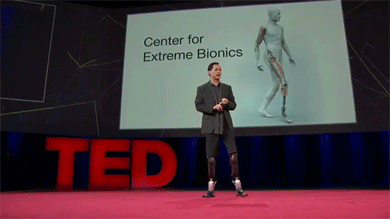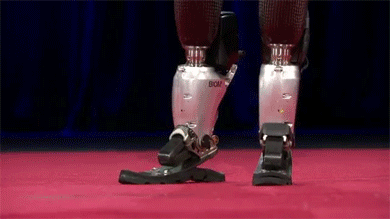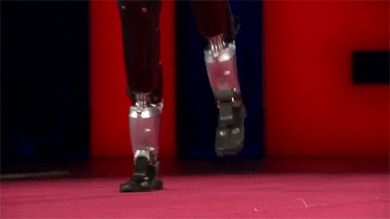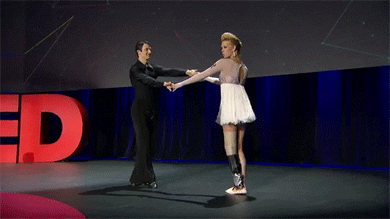Hugh Herr: The New Bionics That Let Us Run, Climb And Dance








Hugh Herr: The new bionics that let us run, climb and dance
More Posts from Stubborn-turtle-blog and Others

Thousands of scientists in Germany, Peru and Taiwan are preparing for a new year without online access to journals from the Dutch publishing giant Elsevier. Contract negotiations in both Germany and Taiwan broke down in December, while Peru’s government has cut off funding for a licence.
“It’s very unpleasant,” says Horst Hippler, spokesperson for the DEAL consortium of state-funded universities and research organizations, which is overseeing negotiations in Germany. “But we just cannot accept what Elsevier has proposed so far.”
Continue Reading.
Asteroid Terms: Explained
There are interesting asteroid characters in our solar system, including an asteroid that has its own moon and even one that is shaped like a dog bone! Our OSIRIS-REx mission launches at 7:05 p.m. EDT today and will travel to asteroid Bennu.

Scientists chose Bennu as the target of the OSIRIS-REx mission because of its composition, size and proximity to Earth. Bennu is a rare B-type asteroid (primitive and carbon-rich), which is expected to have organic compounds and water-bearing minerals like clays.
Our OSIRIS-REx mission will travel to Bennu and bring a small sample back to Earth for study.

When talking about asteroids, there are some terms scientists use that might not be in your typical vocabulary…but we’ll help with that!
Here are a few terms you should know:
Orbital Eccentricity: This number describes the shape of an asteroid’s orbit by how elliptical it is. For asteroids in orbit around the sun, eccentricity is a number between 0 and 1, with 0 being a perfectly circular orbit and 0.99 being a highly elliptical orbit.
Inclination: The angle, in degrees, of how tilted an asteroid’s orbit is compared to another plane of reference, usually the plane of the Earth’s orbit around the sun.
Orbital Period: The number of days it takes for an asteroid to revolve once around the sun. For example, the Earth’s orbital period is 365 days.
Perihelion Distance: The distance between an asteroid and the sun when the asteroid is closest to the sun.
Aphelion Distance: The distance between the asteroid and the sun when the asteroid is farthest away from the sun.
Astronomical unit: A distance unit commonly used to describe orbits of objects around the sun. The distance from the Earth to the sun is one astronomical unit, or 1 AU, equivalent to about 93 million miles or 150 million kilometers.
Diameter: A measure of the size of an asteroid. It is the length of a line from a point on the surface, through the center of the asteroid, extending out to the opposite surface. Irregularly shaped asteroids may have different diameters depending on which direction they are measured.
Rotation Period: The time it takes for an asteroid to complete one revolution around its axis of rotation. For example, the rotation period of the Earth is approximately 24 hours, or 1 day.
Spectral Type: The classification of an asteroid, based on a measurement of the light reflected by the asteroid.

Watch live launch coverage of OSIRIS-REx to asteroid Bennu starting at 5:30 p.m, on NASA TV: http://www.nasa.gov/nasatv
Make sure to follow us on Tumblr for your regular dose of space: http://nasa.tumblr.com

Lovelace’s friend Charles Babbage designed a concept for a machine he called the “Analytical Engine” – essentially a mechanical computer that would have relied on punch cards to run programs. He recruited Lovelace to translate some notes from one of his lectures, but while Lovelace was translating she added to the notes herself.
The notes grew to three times their original length, as Lovelace described what many call the first computer program. Because of funding issues, the machine was not built during her and Babbage’s lifetimes.
But Lovelace’s published article on the Analytical Engine later became a source of inspiration for Alan Turing’s work to build the first modern computers in the 1940s.
Women are sometimes considered outsiders in the science and technology fields, but Lovelace and many of the female computer programmers who followed her are proof that this paucity is a function of society, not capability. We forget or never learn about the female “computers” who programmed early mechanical machines in World War II, or that the women’s magazine Cosmopolitan once ran articles suggesting that women were perfectly suited for programming.
If the lack of acknowledgement of women’s contributions to science, technology, engineering, and mathematics (STEM) fields grinds your gears, then Ada Lovelace should be one of the first names you go to right that wrong.
Further reading:
Wikipedia profile
10 Things You May Not Know About Ada Lovelace
What if there were more women in tech?
Why we ALL need to celebrate Ada Lovelace Day
Brief comment on Gender Parity in TES games
So, apparently saying that there should be more female and non-binary characters in TES franchise is a big offense to some players. Some people don’t think there’s anything wrong by having male characters as a clear majority in all games, some people “just want to enjoy their fantasy game” and don’t have patience to face even a little bit of seriousness in their lives without having to express how “graphs” “spoil the fun”.
Well, we just wanted to say this: if you don’t think there should be more space for women and non-binary characters in TES games (and in all games and stories in general) than there is now, we won’t miss you if you unfollow us.
Happy holidays to you all,
@theelderscrollslore

Jupiter and Io
js

IS SCIENCE EATING ITS YOUNG?
Background. Scientists and policy makers around the world increasingly worry about the plight of young researchers in academia, and for good reason. Competition for tenure-track positions has surged, and some early career researchers face tough odds in the quest for funding. This week Nature pleads the case for the young in a special issue.
Design challenge. How do we visually convey the idea that science is eating its young? We felt it was important to represent a system that has gone wrong, with various consequences, in an engaging way. The metaphor of a video came to mind, as young scientists find themselves trapped in framework, playing along.
We gave this brief to Megapont, an artist that specializes in isometric pixel art, and he created a fantastic scene for the cover. The retro gaming vibe gives a sense of an aging system that needs an overhaul. The detail in the artwork rewards the observant reader, with hidden treasures and references to iconic games and other worlds. And check out the tiny rat fleeing the scene - only a few pixels!
Have your say. Perhaps you are a young scientist who identifies with a cover character? Maybe the one slouched in dispair on the floor, or the one cutting out in bunny slippers? We’d like to hear your story – here’s a tumblr just for you: researchrealities.tumblr.com
-Kelly Krause
I'd never heard about this before
Islam is the toughest religion to leave because of the restrictions and consequences associated with leaving. I know there are a lot of people out there contemplating leaving Islam and are already feeling agnostic. My piece of advice to them would be to not come out publicly with your apostasy. You can leave Islam if it feels like the right move, but if you are afraid of the consequences, then keep a secret. There are many ex-Muslims on tumblr, such as myself, you can speak to anonymously if you just need help or someone to share your views with.
Superhenge?
Last year, an international team of scientists mapping the underground landscape surrounding Stonehenge announced that they had located a massive stone monument that dwarfed its ancient neighbor. When archaeologists started excavating “Superhenge” earlier this month, however, they found something completely different.

Keep reading
-
 hanomalia liked this · 4 weeks ago
hanomalia liked this · 4 weeks ago -
 nonahnopenoway liked this · 4 months ago
nonahnopenoway liked this · 4 months ago -
 7-a-m liked this · 6 months ago
7-a-m liked this · 6 months ago -
 mechatrnsatlanticfoe liked this · 6 months ago
mechatrnsatlanticfoe liked this · 6 months ago -
 the-ever-evolving-queendom reblogged this · 6 months ago
the-ever-evolving-queendom reblogged this · 6 months ago -
 the-ever-evolving-queendom liked this · 6 months ago
the-ever-evolving-queendom liked this · 6 months ago -
 sandwitchsstuff liked this · 6 months ago
sandwitchsstuff liked this · 6 months ago -
 goodbloker reblogged this · 7 months ago
goodbloker reblogged this · 7 months ago -
 goodbloker liked this · 7 months ago
goodbloker liked this · 7 months ago -
 loveofmotion reblogged this · 9 months ago
loveofmotion reblogged this · 9 months ago -
 micheletomasini1980 liked this · 10 months ago
micheletomasini1980 liked this · 10 months ago -
 tinyballerinadancer1 liked this · 11 months ago
tinyballerinadancer1 liked this · 11 months ago -
 goodeffingrief liked this · 11 months ago
goodeffingrief liked this · 11 months ago -
 accessibleacademia reblogged this · 1 year ago
accessibleacademia reblogged this · 1 year ago -
 cosymike23 liked this · 1 year ago
cosymike23 liked this · 1 year ago -
 kvnsk liked this · 1 year ago
kvnsk liked this · 1 year ago -
 destroyergreen liked this · 1 year ago
destroyergreen liked this · 1 year ago -
 thurgon liked this · 1 year ago
thurgon liked this · 1 year ago -
 moreira635 liked this · 1 year ago
moreira635 liked this · 1 year ago -
 creep9876-blog liked this · 1 year ago
creep9876-blog liked this · 1 year ago -
 ppoundcakee liked this · 1 year ago
ppoundcakee liked this · 1 year ago -
 drt3159061 liked this · 1 year ago
drt3159061 liked this · 1 year ago -
 thismoforighthere6 reblogged this · 1 year ago
thismoforighthere6 reblogged this · 1 year ago -
 thismoforighthere6 reblogged this · 1 year ago
thismoforighthere6 reblogged this · 1 year ago -
 inquietanteserenidad reblogged this · 1 year ago
inquietanteserenidad reblogged this · 1 year ago -
 keepcalmandstayfit liked this · 1 year ago
keepcalmandstayfit liked this · 1 year ago -
 sad-lacra reblogged this · 1 year ago
sad-lacra reblogged this · 1 year ago -
 cloudwindyuna liked this · 1 year ago
cloudwindyuna liked this · 1 year ago -
 qidynamics reblogged this · 1 year ago
qidynamics reblogged this · 1 year ago -
 qidynamics liked this · 1 year ago
qidynamics liked this · 1 year ago -
 reallyclassyobservation liked this · 1 year ago
reallyclassyobservation liked this · 1 year ago -
 babemasi liked this · 1 year ago
babemasi liked this · 1 year ago -
 7886lagb liked this · 1 year ago
7886lagb liked this · 1 year ago -
 kristos69 liked this · 1 year ago
kristos69 liked this · 1 year ago -
 sawberri liked this · 1 year ago
sawberri liked this · 1 year ago -
 greatgentlementyrant liked this · 1 year ago
greatgentlementyrant liked this · 1 year ago -
 player-ex liked this · 1 year ago
player-ex liked this · 1 year ago -
 zerudaswonderland liked this · 1 year ago
zerudaswonderland liked this · 1 year ago -
 aradiantsun reblogged this · 1 year ago
aradiantsun reblogged this · 1 year ago
Gaming, Science, History, Feminism, and all other manners of geekery. Also a lot of dance
243 posts




